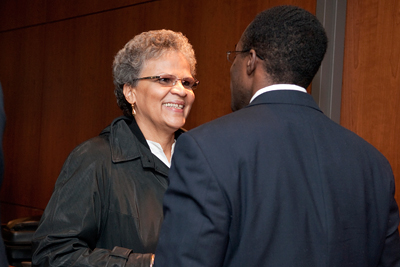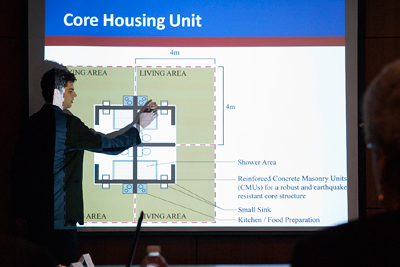Student consulting firm works on relocating and housing earthquake survivors in Haiti
By Krishna Ramanujan


Since the catastrophic Jan. 12 earthquake, many residents of Port-au-Prince, Haiti, have been forced into crowded, muddy encampments. The survivors now face flooding, inadequate housing and health care, overflowing sewage, and lack of food and clean water.
A group of Cornell graduate students has formed a consulting firm that has been working nonstop to find ways to relocate one such camp to a better site and secure permanent new housing opportunities for earthquake survivors.
The tent camp of some 6,300 impoverished Haitians is on a football field next to the Weill Cornell Medical College-affiliated GHESKIO clinic, a Port-au-Prince research clinic working on HIV/AIDS and tuberculosis that is also currently providing humanitarian assistance and emergency care for the camp residents.
The Cornell Global Solutions (CGS) pro bono consulting firm -- made up mostly of master's students in the Cornell Institute for Public Affairs (CIPA) and Department of City and Regional Planning -- presented its recommendations March 15 to a visiting delegation of international NGO officials, including Michèle Pierre-Louis, former prime minister of Haiti and founder of the Knowledge and Freedom Foundation (FOKAL), a community development NGO.
The consulting firm's goal is to "help the community to improve living conditions and restore livelihoods," said Frantz Seide, a CIPA graduate student from Haiti seeking a Master's in Public Administration. The firm is an offshoot of last fall's course Project Planning in Developing Countries, taught by David Lewis, city and regional planning professor and director of CIPA.
The GHESKIO clinic asked Cornell for help via Alice Pell, vice provost for international relations, who visited Haiti last month and delivered CDs compiled by CGS containing scarce technical handbooks on emergency responses, housing, sanitation and rebuilding.
GHESKIO has asked CGS to not only help with site development and relocating survivors to a better temporary site, but also to design a permanent settlement with "basic infrastructure upon which future residents, individuals and families will be able to build their homes," said Seide.
CGS has already designed a preliminary four-phase plan for building on 1,400 plots with 16 square meters for each household, said George Stirrett-Wood, a first-year CIPA MPA student. Built to withstand future earthquakes and hurricanes, the housing is designed in pods of four households each. The core units include walls, roofs, toilets, sinks and a kitchen area with the expectation that residents would complete the construction themselves. The plans include basic neighborhood amenities, a school, and a health clinic, jobs and formation of a public/private neighborhood foundation to provide neighborhood governance.
"I want to congratulate you. It's very inspiring, with very clear propositions," said Pierre-Louise after the presentation. She then asked who would own the houses. CGS is working out donor-funded micro-financing that the neighborhood foundation would administer, and once the loans are paid off, residents would be given title to the land, said Seide.
The group also discussed the micro-financing structure; reselling properties; community engagement; the need for green and open spaces; building materials; neighborhood security; fire dangers; placement of the school; and sanitation and sewage issues.
"This [plan] allows us to take a huge set of issues and break them down into a set of discrete challenges, that can be addressed one by one," said Lewis.
Other delegates included the executive director of FOKAL and a representative from the Open Society Initiative.
To donate to GHESKIO, go to: http://weill.cornell.edu/globalhealth/.
Media Contact
Get Cornell news delivered right to your inbox.
Subscribe